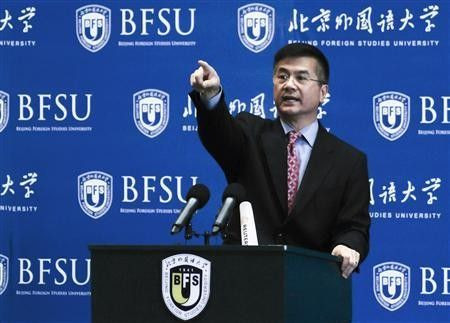Locke Calls for Open Trade, Investment in China-U.S. Relations

China and the United States should reduce trade and investment barriers to create jobs, U.S. Ambassador to China Gary Locke said on Friday, striking a broadly cooperative tone in his first official public address since assuming the position in August.
Reflecting the priorities of President Barack Obama, who on Wednesday unveiled a plan to ease stubbornly high U.S. unemployment rates, Locke's address to an elite group of Chinese students was largely aimed at highlighting the potential in sometimes rocky U.S.-China relations.
We very much encourage more Chinese investment in the United States, and we would hope that China would respond by not having so many limitations on opportunities for foreign companies to invest in China, he told about 400 students at Beijing's Foreign Studies University.
Locke, while in his previous position as U.S. commerce secretary, had vowed to press for greater and more fair access for U.S. goods and services in Chinese markets before arriving in Beijing.
He had been particularly outspoken on Beijing's indigenous innovation policies that shut foreign companies entirely out of industries or make unacceptable technology transfer provisions a condition of operating in China.
Chinese leaders have verbally rolled back on those policies, but foreign companies say they still face discriminatory practices and regulatory hurdles, particularly at the local level where enforcement of Beijing's edicts can be spotty.
On Friday, Locke stuck to a more benign message of potential cooperation between the world's two largest economies, speaking in broad terms about increasing Chinese investment in the U.S. to create U.S. jobs.
Millions of jobs are sustained in China and the United States by the trade we do with one another. And, our companies make investments in each others' countries, and as they do so we are creating jobs for both of our peoples, he said.
Locke has enjoyed a largely warm reception in China, in part because he is the first Chinese-American ambassador to take up the post.
But he also made an egalitarian splash on Chinese Internet sites when photos spread online that showed him lining up at a coffee shop at Seattle airport without the security guards and assistants many Chinese people expect to trail officials.
Arriving at the university to cheers and applause from about 200 camera-wielding students, Locke used that good will to broach the sensitive issues of human rights and Internet freedom.
One Chinese professor in the audience asked Locke if he had ever visited the Great Firewall of China, a reference to China's censored and heavily-monitored Internet.
People want to know that their conversations can be ... kept confidential. And so that issue of trust, preventing fraud, preventing governments from looking in to our conversations, I think, is very important to the continued development of the Internet, Locke said.
We believe that societies that respect human rights and address the aspirations of their people are more prosperous, successful and stable, Locke said, adding that China's political direction was solely for its people to decide.
© Copyright Thomson Reuters {{Year}}. All rights reserved.





















